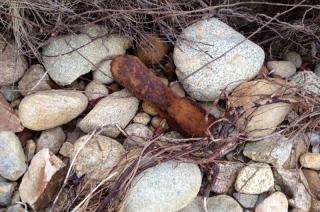The state police bomb squad was called to Chappaquiddick after the discovery of two World War II practice bombs, later determined to be inert, on a remote barrier beach at Cape Pogue.
Munitions removal
2015
The Army Corps of Engineers has recommended a $9.8 million project to remove practice bombs and other debris from a former World War II bombing range along the south shore. The five-year investigation and feasibility study was completed this month.
2014
Underlying the peaceful scene at Cape Pogue Bay are an unknown number of unexploded practice bombs, dating to wartime years when the area was used for military training.
2008
Residents along the south shore of the Island will likely hear loud explosions next Friday due to an operation conducted by the U.S. Navy to clear and remove unexploded ordnance on Noman’s Land left over from training exercises during World War II.
The operation to collect and detonate munitions was initially scheduled for today, although a Navy spokesman said yesterday it was postponed until next Friday, Oct. 10, due to the threat of inclement weather.
Residents along the south shore of the Island may hear loud explosions in the coming months due to an operation conducted by the U.S. Navy to clear and remove unexploded ordnance on Noman’s Land left over from training exercises during World War II.
David Barney, base realignment and closure coordinator for the U.S. Navy, said this week the objective is to identify and clear military ordnance that may have been exposed since the last clearing operation in 2003.
The continued discovery of unexploded practice bombs from World War II has forced the immediate closure of Little Neck on Chappaquiddick to all public access.
The Trustees of Reservations, which owns the property, announced Friday that approximately 60 acres along the western edge of Cape Pogue Bay will be closed indefinitely.



